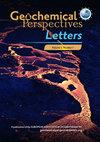超高分辨率质谱法探测球粒质有机物多样性
IF 3.7
1区 地球科学
Q1 GEOCHEMISTRY & GEOPHYSICS
引用次数: 2
摘要
原始碳质球粒陨石在有机含量方面表现出无与伦比的多样性,除了不同程度的热液蚀变。这种多样性是来自流体循环还是来自多种前体,仍然是了解碳质小行星形成的一个悬而未决的问题。采用激光解吸电离傅立叶变换离子回旋共振质谱(LDI-FTICR-MS)对近期CM碳质球粒陨石陨落的大分子碳以及Orgueil (CI)和Tarda (C2)进行了分析。研究了低功率激光束释放的分子碎片的多样性。化学家族的丰度与水蚀变的程度有关,水蚀变促进了结构芳香化。弱蚀变的巴黎保留了最大的化学非均质性,而在更多蚀变的球粒陨石中则消失了。Orgueil和Tarda不溶性有机质有相似之处;这与塔尔达和奥盖伊起源于外带地区相一致。应用于返回的小行星样本,FTICR-MS可能有助于揭示太阳系早期阶段有机化合物的起源和演化。本文章由计算机程序翻译,如有差异,请以英文原文为准。
Diversity of chondritic organic matter probed by ultra-high resolution mass spectrometry
Primitive carbonaceous chondrites exhibit an unparalleled diversity in terms of their organic content, in addition to a variable degree of hydrothermal alteration. Whether this diversity results from the circulation of fluids or from a multiplicity of precursors remains an open question of prime interest to understand the formation of carbonaceous asteroids. We applied laser desorption ionization Fourier transform ion cyclotron resonance mass spectrometry (LDI-FTICR-MS) on the macromolecular carbon of recent CM carbonaceous chondrite falls, as well as Orgueil (CI) and Tarda (C2). We probed the diversity of molecular fragments released under low power laser beam. The abundance of the chemical families is correlated to the extent of aqueous alteration, which promotes a structural aromatisation. The weakly altered Paris has retained the largest chemical heterogeneity, whilst it is lost in more altered chondrites. Orgueil and Tarda insoluble organic matter share similarities; this is consistent with Tarda and Orgueil originating from the outer belt region. Applied to returned asteroidal samples, FTICR-MS may help unravelling the origin and evolution of organic compounds during the early stages of the solar system.
求助全文
通过发布文献求助,成功后即可免费获取论文全文。
去求助
来源期刊

Geochemical Perspectives Letters
Earth and Planetary Sciences-Geochemistry and Petrology
CiteScore
7.00
自引率
2.00%
发文量
42
审稿时长
15 weeks
期刊介绍:
Geochemical Perspectives Letters is an open access, internationally peer-reviewed journal of the European Association of Geochemistry (EAG) that publishes short, highest-quality articles spanning geochemical sciences. The journal aims at rapid publication of the most novel research in geochemistry with a focus on outstanding quality, international importance, originality, and stimulating new developments across the vast array of geochemical disciplines.
 求助内容:
求助内容: 应助结果提醒方式:
应助结果提醒方式:


